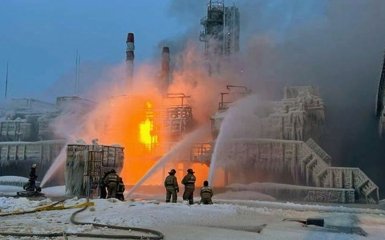Russia was able to quickly repair some of the key oil refineries that were hit by Ukrainian drone strikes.
Russia is trying to repair refineries damaged by drones
The capacity idled by attacks decreased from 14% to about 10% at the end of March.
Reuters calculations evidence this.
It is noted that after the attack on the Taneko plant on April 2, there were no reports of successful Ukrainian attacks on large Russian refineries, and Russia is quickly restoring them despite difficulties in obtaining Western technologies.
Reuters writes that the Ryazan plant, owned by Rosneft, has returned to operation the AVT-4 primary oil processing unit and the AVT-6 main unit, as well as the Kuibyshev refinery, is repairing AVT-4, the Syzran unit AVT-5, and previously stopped at maintenance of the AVT-6 installation.
Total Russian primary refining capacity, idled by Ukrainian drone attacks, fell to 90,500 tonnes per day from about 123,800 tonnes per day earlier.
However, as noted by the agency, Russia's total primary oil refining capacity, out of order due to various shutdowns and maintenance, is expected to be 4.4 million tons in April (compared to 4.1 million tons in March).
Ukrainian drone attacks on Russian oil refineries
On March 13, the SSU used drones to attack oil refineries in the Ryazan, Nizhny Novgorod, and Leningrad regions of the Russian Federation. Sources told Suspilno that GUR drones attacked an oil products plant in the Rostov region.
On March 15, Ukrainian drones attacked the "First Plant" enterprise in the Kaluga region of the Russian Federation, which is engaged in oil processing.
On March 16, drones attacked three Russian oil refineries in the Samara region: the Novokuybyshevsky, Kuybyshevsky, and Syzransky refineries. They process about 25 million tons of oil per year, which is almost 10% of the Russian Federation's oil refining. According to sources, this is a special operation of the SBU.
On the morning of April 2, drones attacked two plants in the cities of Yelabuga and Nizhnyokamsk (Republic of Tatarstan, Russia). In particular, the so-called special economic zone "Alabuga" is located in Yelabuz, where the Russians established the production of Iranian Shahed-type kamikaze drones. An oil refinery was attacked in Nizhnekamsk.
Also under attack was the factory in Yelabuz, where the Russians collect Iranian "shahedis", marking them as "Geran-2".
The night explosions at the oil refinery in Tatarstan are a joint operation of the Security Service of Ukraine and the State Security Service. The source noted that a Ukrainian long-range drone hit the primary oil processing facility at the Nizhnyokamsk refinery, after which a fire broke out there. The capacity of this installation was 8 million tons of oil, which is 2.6% of the total annual refining of the Russian Federation per year. In addition, this plant is one of the five largest refineries of the Russian Federation.
An unnamed NATO representative told Reuters that Ukrainian strikes on Russian oil refineries could disable more than 15% of Russia's facilities.
On March 22, the United States urged Ukraine to stop attacks on Russia's energy infrastructure, warning that drone strikes could lead to a rise in global oil prices and provoke retaliation. Deputy Prime Minister Olga Stefanishyna said that oil refineries on the territory of Russia are legal targets from a military point of view.




